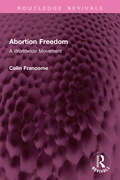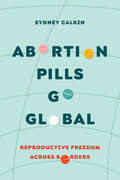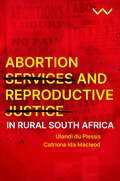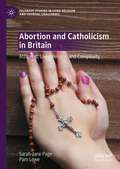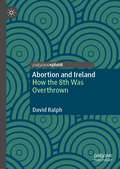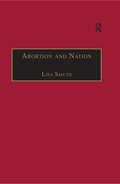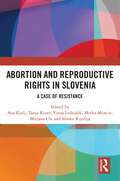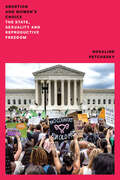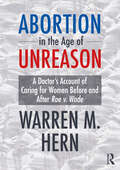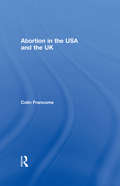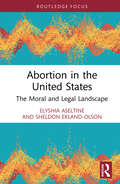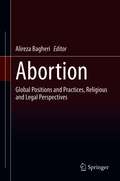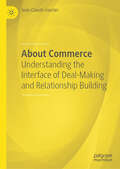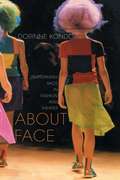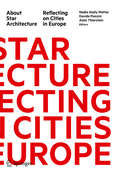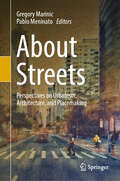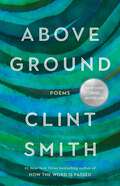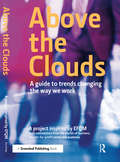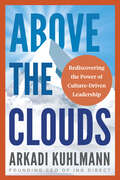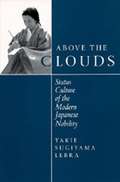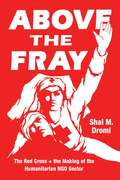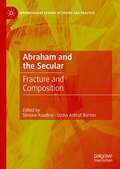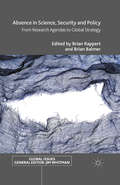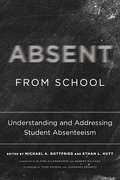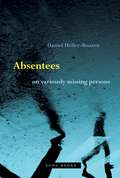- Table View
- List View
Abortion Freedom: A Worldwide Movement (Routledge Revivals)
by Colin FrancomeFirst published in 1984, Abortion Freedom explains the main reasons for widespread international liberalisation of abortion laws. Colin Francome points out that the birth control movement had its roots in a concern with overpopulation and that this is still a crucial issue today. A major change, however, is that whereas in the early days the socialists were often opposed to birth control they are now amongst the keenest supporters of the woman’s right to choose. The author pays particular attention to the debates in the United States, France and Italy. It is aimed primarily at students of politics, sociology and law but it has a much wider appeal to the general public as a readable explanation of the ideas and strategies of the opposing forces involved.
Abortion Pills Go Global: Reproductive Freedom across Borders (Reproductive Justice: A New Vision for the 21st Century #7)
by Dr. Sydney CalkinAn unprecedented, up-close look into the global self-managed abortion movement. Abortion pills have made safe medication abortion possible for millions of people around the world, even in the most restrictive circumstances. In this timely book, Sydney Calkin illustrates the profound, transformative promise of these pills—which are safe, effective, and responsible for a sharp decline in maternal mortality. Abortion Pills Go Global demonstrates that the widespread practice of self-managed medication abortion makes it more difficult for countries to enforce oppressive abortion laws and less willing to do so. Taking a bold and unique geographic approach, this book follows these pills as they are manufactured and transported by feminist activists from India to Ireland, Northern Ireland, Poland, and the United States. Calkin shows that the growing availability of abortion pills in places with restrictive laws means more people have access to self-managed healthcare. Abortion Pills Go Global looks ahead to see how the broader politics of abortion could shift in response to this global movement—one that looks not to laws for protection but to on-the-ground feminist mobilizations across borders.
Abortion Services and Reproductive Justice in Rural South Africa
by Ulandi du Plessis Catriona Ida MacleodAccessing abortion services in rural areas under conditions of liberal abortion legislation is neither straightforward nor simple. As the South African example shows, the liberalisation of abortion legislation was the first step in granting pregnant persons access to abortion care. Despite this and some progress in implementation, many challenges persist resulting in a lack of services, especially in areas where distances and transport costs are a factor. Drawing on the findings of a study conducted in three rural districts of the Eastern Cape, the authors highlight the complexities involved in understanding problematic or unwanted pregnancies and abortion services within these communities; the reported barriers to, and facilitators of, access to abortion services among rural populations; and preferences for types of abortion services.A key finding is the conundrum of costs versus confidentiality: lack of confidentiality involves additional costs to access services outside the area; high costs mean that confidentiality may have to be foregone, which leads to stigma. The authors place the findings within a reparative reproductive justice framework and present a comprehensive set of recommendations. Abortion Services and Reproductive Justice in Rural South Africa is an insightful and informative resource – the first of its kind – for scholars in health and sociology, reproductive health policy makers, national planners, health facility managers and providers, and activists.
Abortion and Catholicism in Britain: Attitudes, Lived Religion and Complexity (Palgrave Studies in Lived Religion and Societal Challenges)
by Pam Lowe Sarah-Jane PageThis book details how British Catholic communities view abortion, highlighting the diversity of positions which often contrast with the official line of Catholic Church doctrine. The authors’ extensive qualitative investigation involving various Catholic constituents demonstrates the complex ways attitudes are formed. Based on interviews with priests, Catholic parishioners, anti-abortion activists and Catholics living in close proximity to activism, this book takes a lived religion approach to argue that attitudes and approaches to abortion are nuanced and contextual, with the Catholic concept of individual conscience playing a fundamental role in navigating abortion issues. Ultimately, this investigation helps to explore in much greater depth the increased liberalisation in attitudes among Catholics towards abortion, at a time when Catholic activism opposing abortion is growing, and therefore shines a light on the conflicts that are apparent at the heart of Catholic parishes. Thisbook will be of interest to scholars in Gender and Sexuality Studies, Sociology, Theology and Religious Studies.
Abortion and Ireland: How the 8th Was Overthrown
by David RalphThis book asks the crucial question of how it came to pass that on the 25 May 2018, the Irish electorate voted by a landslide in favour of changing its abortion legislation that, for the previous thirty-five years, had been one of the most restrictive regimes in Europe. The author shows how, alongside traditional campaigning tactics such as street demonstrations, door-to-door canvassing, and the distribution of pro-choice merchandise and information leaflets, a key strategy of pro-choice advocacy groups was to encourage first-person abortion story-sharing by women in their efforts to repeal the Eighth Amendment, which had effectively banned abortion provision in the country. The book argues that a normalizing of abortion talk took place in the lead-up to the referendum, with women speaking publicly in unprecedented numbers about their abortion histories. These women storytellers were mirroring certain pro-choice movements in other contexts, where a new ‘sound it loud, say it proud’ narrative around abortion experiences has emerged as a central contemporary strategy for destigmatizing abortion discourse.Students and scholars across a range of disciplines, including law, gender studies, sociology, and human geography, will find this book of interest.
Abortion and Nation: The Politics of Reproduction in Contemporary Ireland
by Lisa SmythAbortion politics are contentious and divisive in many parts of the world, but nowhere more so than in Ireland. Abortion and Nation examines the connection between abortion politics and hegemonic struggles over national identity and the nation-state in the Irish Republic. Situating the abortion question in the global context of human rights politics, as well as international social movements, Lisa Smyth analyses the formation and transformation of abortion politics in Ireland from the early 1980s to the present day. She considers whether or not the shifting connections between morality, rights and nationhood promise a new era of gender equality in the context of nation-state citizenship. The book provides a new sociological framework through which the significance of conflict over abortion and reproductive freedom is connected to conflict over national identity. It also offers a distinctive in-depth consideration of the connection between gender and nationhood, particularly in terms of its impact on women's status as citizens; within the nation-state; within the European Union; and as members of a global civil society.
Abortion and Reproductive Rights in Slovenia: A Case of Resistance
by Ana Kralj Tanja Rener Vesna Leskošek Metka Mencin Mirjana Ule Slavko KurdijaAbortion and Reproductive Rights in Slovenia: A Case of Resistance provides a detailed and in-depth analysis of the situation of sexual and reproductive rights in Slovenia. This important intervention comes at a time when sexual and reproductive rights in Slovenia and around the world are assailed by populist and neoconservative discourses. The authors provide a detailed account of the history of the struggle for reproductive rights, particularly the struggles for access to safe abortion, insights based on interviews with fellow activists and an analysis of Slovenian public opinion on abortion in a temporal and comparative perspective. The scholar-activist authors put the issue of sexual and reproductive rights at the forefront of the social, political and scientific agenda in the name of collectivity and solidarity, reinforcing the potential apparent within civil society and social movements. This work will be of interest to researchers and activists with an interest in gender and reproductive rights in contemporary Europe.
Abortion and Woman's Choice: The State, Sexuality and Reproductive Freedom
by Rosalind Pollack Petchesky&“The best book I have read on the politics of reproduction. It raises complex theoretical and strategic questions, in a clear and accessible way, and represents an important breakthrough in feminist thinking.&”– Leslie Doyal, author of What Makes Women SickThis prize-winning study is the definitive work on the politics of abortion and fertility. Rosalind Pollack Petchesky provides overwhelming evidence against the anti-abortion forces and in the process takes up issues of teenage sexuality, the politics of eugenics, and women&’s relationship to medical technology. The book&’s continuing relevance is a tribute to the author and a sad indictment of contemporary politics.
Abortion in the Age of Unreason: A Doctor's Account of Caring for Women Before and After Roe v. Wade
by Warren M. HernThis vivid account by a nationally prominent doctor reports the daily challenges of offering and receiving abortion services in a volatile political and social atmosphere. In stories from the front lines – from protecting patients and staff from protesters’ attacks to the dangers to women of restricted access to abortion services, and the pertinent findings of his remote research in Latin America, Hern’s book is strikingly detailed just as it exposes the needs of women and the U. S. national interest. Dr. Hern – an abortion specialist, researcher, scholar, and highly visible public advocate –shows how abortion saves women’s lives given the many risks that arise during pregnancy – remarkably more than most people realize. He points to political and national solutions to reverse a reawakened crisis that now threatens democracy. Throughout the book, Dr. Hern shows how the current emergency was largely created by political actors who have exploited and distorted the abortion issue to increase and consolidate their power.A vital component of women’s health care, the crisis over abortion is not new. Yet the reversal of Roe v. Wade and the steady accumulation of power by America’s right wing has put the issue at a level of urgency and national prominence not seen since the days before legalization. Women’s need for safe abortion services will continue as the struggle to secure their rights intensifies. This book is about that struggle during what has evolved, over the last 50 years, to an Age of Unreason.
Abortion in the USA and the UK
by Colin FrancomeRecent years have revealed the different experiences of abortion in the UK and the USA. The United States has a higher abortion rate accompanied by a higher political profile for the issue. In fact, one of George W. Bush's first acts in 2001 was to ban American funding for overseas organizations carrying out abortions. The USA has also experienced a higher degree of abortion-related violence, with several people linked to abortion services being targeted and even killed. Compelling and enlightening in its approach, this invigorating volume compares the two countries' abortion laws and outlines the distinctions. The usually conservative American society has a much more liberal abortion law than the United Kingdom, whose female citizens can obtain an abortion relatively easily although in fact they do not have the right to choose. This stimulating volume examines the comparative positions taken by each country and makes important suggestions for the future.
Abortion in the United States: The Moral and Legal Landscape
by Elyshia Aseltine Sheldon Ekland OlsonThis book explores the seismic shift brought about by the 2022 US Supreme Court decision in Dobbs v. Jackson Women’s Health Organization, which dramatically changed the constitutional standing of abortion decisions set in place by Roe v. Wade 50 years earlier. The authors describe the history of US Supreme Court’s decision-making around abortion and some of its attendant considerations, including the constitutional right to privacy, moral obligations to protect life, and determinations about when life begins.When Dobbs was decided, legal control over abortion was returned to the states, resulting in wildly divergent access to abortion across the nation. As important, Dobbs raised a host of additional legal and moral questions that will no doubt be the focus of many future courtroom and legislative debates.This text is designed for undergraduate students across a range of academic disciplines. It lays bare the complicated moral dimensions of the competing arguments about abortion and how these considerations have fared in legal decisions, so students can make sense of them for themselves.
Abortion: Global Positions and Practices, Religious and Legal Perspectives
by Alireza BagheriRather than providing a global solution to the problem of abortion —to abort or not to abort—this volume sheds light on different but equally critical dimensions of abortion in global debate and practice. The aim is to elaborate on different value systems and policies in order to empower individuals to make well-informed decisions about abortion guided by moral reflection. The twenty one chapters of this volume are written by distinguished scholars in each of the religious and non-religious schools of thought, offering an exhaustive survey of the differing religious and legal views on abortion within the international community. The contributors present authoritative discussions in favor of or against abortion based on their perspectives and practices. As a result, the content of this book provides a foundational platform for better understanding, meaningful dialogue, and tolerance on a social issue which has divided individuals, philosophers, theologians, policy makers, and legislators within and across societies for centuries.
About Commerce: Understanding the Interface of Deal-Making and Relationship Building
by Jean-Claude UsunierThe word &‘commerce&’ is infrequently used in contemporary business speak and, when it is, it is typically as a somewhat archaic synonym for business or trade, or otherwise in the context of &‘e-commerce&’. This book defines commerce by its traditional meaning, as the activity of transaction and exchange, and explores the corresponding interaction of human behaviour and economic interests. This book develops not only an understanding of the ambiguous interface between deals and relationships, but also the skills to manage it according to the situations and contexts in which it arises. The aim is to use advances on the fundamental phenomena of economic exchange (trust, reciprocity, altruism, reputation, etc.) and to apply them to a detailed explanation of the ins and outs of commerce. Of great interest to scholars and students of marketing, organisational behaviour and economics, this book attempts to bring together these advances to focus on the commercial phenomenon and propose a synthetic approach to the exchange relationship.
About Face: Performing Race in Fashion and Theater
by Dorinne KondoFrom the runways of Paris to the casting controversies over BMiss Saigon, from a local demonstration at the Claremont Colleges in California to the gender-blending of BM. Butterfly, BAbout Face examines representations of Asia and their reverberations in both Asia and Asian American lives. Japanese high fashion and Asian American theater become points of entry into the politics of pleasure, the performance of racial identities, and the possibility of political intervention in commodity capitalism. Based on Kondo's fieldwork, this interdisciplinary work brings together essays, interviews with designer Rei Kawakubo of Comme des Garcons and playwright David Henry Hwang, and "personal" vignettes in its exploration of counter-Orientalisms.
About Star Architecture: Reflecting on Cities in Europe
by Davide Ponzini Alain Thierstein Nadia Alaily-MattarCities across the world have been resorting to star architects to brand their projects, spark urban regeneration and market the city image internationally. This book shifts the attention from star architects to star architecture, arguing that the process of deciding about and implementing relevant architectural and urban projects is not the product of any single actor. Star architecture can, in fact, be better studied and understood as assembled by multiple actors and in its relationship with urban transformation. In its 18 chapters, the book presents a multidisciplinary collection of expert contributions in the fields of urban planning, architecture, media studies, urban economics, geography, and sociology, consistently brought together for the first time to deal with this topic. Through a vast array of case studies and analytical techniques touching over 20 cities in Europe, the book shows the positive and more problematic impacts of star architecture with reference to the preservation of built heritage, tourism and media. The book will be of interest to architects, sociologists, urban planners, and public administrators.
About Streets: Perspectives on Urbanism, Architecture, and Placemaking
by Gregory Marinic Pablo MeninatoFocusing on the street as a socio-spatial catalyst, this book fosters a comprehensive conversation on the past, present, and future of streets and public space. While 'the street' is commonly associated with urban form or the metropolitan context of social dynamics and design practices, this interdisciplinary anthology highlights that urban design challenges are global, multidimensional, and transcalar. This critical survey of the city collects a broad scope of practices and phenomena in urbanism, architecture, activism, and participatory design. Individual chapters examine the histories, theories, geographies, architecture, and design of streets offering essential reading for scholars, professionals, students, and enthusiasts of urbanism, urban design, architecture, landscape architecture, planning, geography, sociology, anthropology, cultural studies, economics, and the arts. Over 50 chapters, authored by an international and diverse group of leading academics, theorists, historians, and practitioners, expand the discourse on streets and public space.
Above Ground
by Clint SmithA remarkable poetry collection with "inextinguishable generosity and abundant wisdom" (Monica Youn) from Clint Smith, the #1 New York Times bestselling and National Book Critics Circle award-winning author of How the Word Is Passed. Clint Smith&’s vibrant and compelling new collection traverses the vast emotional terrain of fatherhood, and explores how becoming a parent has recalibrated his sense of the world. There are poems that interrogate the ways our lives are shaped by both personal lineages and historical institutions. There are poems that revel in the wonder of discovering the world anew through the eyes of your children, as they discover it for the first time. There are poems that meditate on what it means to raise a family in a world filled with constant social and political tumult. Above Ground wrestles with how we hold wonder and despair in the same hands, how we carry intimate moments of joy and a collective sense of mourning in the same body. Smith&’s lyrical, narrative poems bring the reader on a journey not only through the early years of his children&’s lives, but through the changing world in which they are growing up—through the changing world of which we are all a part.Above Ground is a breathtaking collection that follows Smith's first award-winning book of poetry, Counting Descent.
Above the Clouds: A Guide to Trends Changing the Way we Work
by EfqmSome of us work to live. Some of us live to work. Some of us, by design or default, don't work at all. Whatever your position, as a stakeholder in today's society, there is no avoiding the complex web that is the world of work. Everyone is affected to some degree by issues such as stress and work-life balance, teleworking, offshoring, stakeholder democracy, globalisation – the list goes on. But, as things continue to change at an ever-faster rate, what can we expect work to look like in the next five, ten, or twenty years? Above the Clouds is the result of a future studies project carried out by the European Foundation for Quality Management (EFQM), a not-for profit foundation that promotes excellence in European business. The project aimed to identify trends that will have an impact on the world of work over the coming decade. Work here is defined in terms of methods, organisation and future challenges. It took two years to create the full picture, which is now available in this book. "Trendspotting" sessions were organised across Europe as a means of gathering ideas on where work was heading in the future. The experience and insights of people from a diverse range of backgrounds were included in the project. Working with raw material from these sessions, researchers investigated each of the trends and their possible ramifications on the world of work. The resulting articles were posted for comment online. People from all around Europe responded and some of these views are quoted in this book. In addition, academics and leading CEOs and executives were asked for their reactions to these trends. Each of the 15 chapters of Above the Clouds analyses a trend in detail and includes perspectives from business, academia and comments from the European public. There are disagreements, but also a surprising amount of convergence on issues such as leadership, outsourcing, global risk, women, age, spirituality, stress and technology. Rather than trying to offer certainty, the book aims to equip people and organisations with the awareness and adaptability they will need to meet tomorrow's challenges to the way we work. It is fascinating reading for anyone interested in how the big issues of work are likely to impact on us all.
Above the Clouds: Rediscovering the Power of Culture-Driven Leadership
by Arkadi KuhlmannThe entrepreneur Time magazine called “the Bad Boy of banking” is back with crucial insights about the importance of business culture in a dizzyingly complex global marketplace.In business, breaking rules is easy. What’s really hard is what comes next: learning how to create, identify, and sustain a culture. It’s the lifeblood of effective leadership. And we aren’t using it the way we should. The world is complex.Everyone and everything is moving faster. When we might have once had time to reflect, we barely have time to react. For a business leader, the consequences of getting it wrong in a competitive 24/7 global marketplace are dire. Second chances? Forget about it.Above the Clouds is entrepreneur and CEO Arkadi Kuhlmann’s seasoned antidote to navigating blind through our increasingly competitive landscape.
Above the Clouds: Status Culture of the Modern Japanese Nobility
by Takie Sugiyama LebraThis latest work from Japanese-born anthropologist Takie Sugiyama Lebra is the first ethnographic study of the modern Japanese aristocracy. Established as a class at the beginning of the Meiji period, the kazoku ranked directly below the emperor and his family.
Above the Fray: The Red Cross and the Making of the Humanitarian NGO Sector
by Shai M. DromiFrom Lake Chad to Iraq, nongovernmental organizations (NGOs) provide relief around the globe, and their scope is growing every year. Policymakers and activists often assume that humanitarian aid is best provided by these organizations, which are generally seen as impartial and neutral. In Above the Fray, Shai M. Dromi investigates why the international community overwhelmingly trusts humanitarian NGOs by looking at the historical development of their culture. With a particular focus on the Red Cross, Dromi reveals that NGOs arose because of the efforts of orthodox Calvinists, demonstrating for the first time the origins of the unusual moral culture that has supported NGOs for the past 150 years. Drawing on archival research, Dromi traces the genesis of the Red Cross to a Calvinist movement working in mid-nineteenth-century Geneva. He shows how global humanitarian policies emerged from the Red Cross founding members’ faith that an international volunteer program not beholden to the state was the only ethical way to provide relief to victims of armed conflict. By illustrating how Calvinism shaped the humanitarian field, Dromi argues for the key role belief systems play in establishing social fields and institutions. Ultimately, Dromi shows the immeasurable social good that NGOs have achieved, but also points to their limitations and suggests that alternative models of humanitarian relief need to be considered.
Abraham and the Secular: Fracture and Composition (Interreligious Studies in Theory and Practice)
by Simone Raudino Uzma Ashraf BartonThis volume offers both theoretical approaches and case studies on the relationship between religion and the secular world. Bringing together contributions from seasoned authors, religious leaders, and brilliant new scholars, it frames the long-standing debate on how to structure a comparative representation of any religion on the one side, and the secular world on the other. Often, the very act of comparing religions exposes them to an assessment of their role in history and politics, and risks leading to some sort of grading and ranking, which is highly unproductive. By candidly discussing the relation between religion and the secular and providing concrete examples from four case studies (Christianity, Islam, Judaism, Baha’I’), this book provides an important reference on how this can be achieved in a neutral way, while keeping in mind the normative finality of seeking conciliation to existing fractures, both within and among religions.
Absence in Science, Security and Policy: From Research Agendas to Global Strategy (Global Issues)
by Brian Rappert Brian BalmerThis book explores the absent and missing in debates about science and security. Through varied case studies, including biological and chemical weapons control, science journalism, nanotechnology research and neuroethics, the contributors explore how matters become absent, ignored or forgotten and the implications for ethics, policy and society.The chapter 'Sensing Absence: How to See What Isn't There in the Study of Science and Security' is open access under a CC BY 4.0 license via link.springer.com.
Absent from School: Understanding and Addressing Student Absenteeism
by Todd Rogers Johannes DemarziIn Absent from School, Gottfried and Hutt offer a comprehensive and timely resource for educators and policy makers seeking to understand the scope, impact, and causes of chronic student absenteeism. The editors present a series of studies by leading researchers from a variety of disciplines that address which students are missing school and why, what roles schools themselves play in contributing to or offsetting patterns of absenteeism, and ways to assess student attendance for purposes of school accountability. The contributors examine school-based initiatives that focus on a range of issues, including transportation, student health, discipline policies, and protections for immigrant students, as well as interventions intended to improve student attendance. Only in the past two or three years has chronic absenteeism become the focus of attention among policy makers, civil rights advocates, and educators. Absent from School provides the first critical, systematic look at research that can inform and guide those who are working to ensure that every child is in school and learning every day.
Absentees: On Variously Missing Persons
by Daniel Heller-RoazenAn intellectually adventurous account of the role of nonpersons that explores their depiction in literature and challenges how they are defined in philosophy, law, and anthropology In thirteen interlocking chapters, Absentees explores the role of the missing in human communities, asking an urgent question: How does a person become a nonperson, whether by disappearance, disenfranchisement, or civil, social, or biological death? Only somebody can become a “nobody,” but, as Daniel Heller-Roazen shows, the ways of being a nonperson are as diverse and complex as they are mysterious and unpredictable. Heller-Roazen treats the variously missing persons of the subtitle in three parts: Vanishings, Lessenings, and Survivals. In each section and with multiple transhistorical and transcultural examples, he challenges the categories that define nonpersons in philosophy, ethics, law, and anthropology. Exclusion, infamy, and stigma; mortuary beliefs and customs; children’s games and state censuses; ghosts and “dead souls” illustrate the lives of those lacking or denied full personhood. In the archives of fiction, Heller-Roazen uncovers figurations of the missing—from Helen of Argos in Troy or Egypt to Hawthorne’s Wakefield, Swift’s Captain Gulliver, Kafka’s undead hunter Gracchus, and Chamisso’s long-lived shadowless Peter Schlemihl. Readers of The Enemy of All and No One’s Ways will find a continuation of those books’ intense intellectual adventures, with unexpected questions and arguments arising every step of the way. In a unique voice, Heller-Roazen’s thought and writing capture the intricacies of the all-too-human absent and absented.
